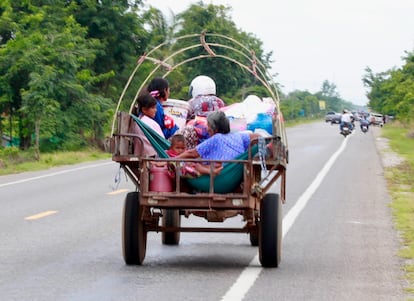Cambodia calls for an immediate ceasefire amid escalation with Thailand


The border conflict between Thailand and Cambodia entered its third consecutive day of fighting this Saturday, leaving at least 32 dead and around 160,000 people evacuated in both Southeast Asian nations. Early in the day, both countries reported renewed heavy artillery attacks and fighting at several points along the disputed border. Phnom Penh has requested an "immediate" and "unconditional" ceasefire from the United Nations Security Council, while Bangkok has expressed its willingness to engage in diplomatic dialogue—which was nipped in the bud on Wednesday, the day before the skirmishes began—and is even open to third-party mediation. This is the worst escalation in more than a decade of a conflict over the delimitation of the territory established in 1907 under French colonial rule.
Cambodian ambassador to the UN, Chhea Keo, has stated that his country wants a “peaceful solution to the dispute,” although Thailand has not publicly commented on Cambodia’s request for a ceasefire. Bangkok declared martial law in eight districts bordering Cambodia on Friday, and Thai Foreign Minister Nikorndej Balankura told AFP that his country is open to dialogue. “If Cambodia wants to resolve this issue through diplomatic means, bilaterally, or even through Malaysia, we are willing to do so. But so far, we have not received any response,” he said.
As the fighting continues, Cambodia's Ministry of National Defense confirmed the deaths of seven people and five members of its armed forces on Saturday, bringing the total death toll on its territory to 13 since Thursday. In addition, 50 civilians and more than 20 military personnel are injured. On the Thai side, authorities have reported the deaths of six uniformed personnel and 13 civilians (including a child and a teenager), as well as 29 soldiers and 30 residents injured since the clashes began.
The UN Security Council held an emergency closed-door meeting on Friday to address the crisis, at the request of several members concerned about the rapid deterioration of the situation and the enormous risk of escalation. Acting Thai Prime Minister Phumtham Wechayachai warned hours before the session that the current clashes "could escalate into war" because heavy weapons are already being used. Images and accounts from the front lines show the deployment of tanks, fighter jets, artillery fire, and ground units.
Although no official statement has been issued regarding the meeting, anonymous diplomatic sources cited by the Associated Press report that the 15 members of the Security Council agreed to call on Thailand and Cambodia to reduce tensions, exercise restraint, and seek a peaceful solution. An explicit call was also made to the Association of Southeast Asian Nations (ASEAN), the regional bloc to which both countries belong, to play an active role in mediation.
In parallel, Malaysia, which currently holds the rotating ASEAN presidency, has offered to mediate to facilitate dialogue. China, for its part, has also expressed its willingness to play a mediating role. Although Beijing has strong economic ties with both sides, this potential role raises concerns in some quarters due to its historical proximity to Phnom Penh.
This morning, the Cambodian Ministry of Defense reported that Thai heavy artillery shells hit multiple towns near the border and demanded an "immediate cessation of all hostilities" by Bangkok. It also urged its neighbor to respect its "obligations under international law" and reiterated its call for an unconditional ceasefire. Cambodia has accused Thailand of using cluster bombs in its launches, a type of weapon banned in much of the world due to the high risk it poses to civilians, as it disperses munitions that can remain unexploded on the ground and detonate later. Bangkok has not commented on the matter, while its leaders have indicated that Cambodia could be guilty of war crimes for attacking civilian infrastructure, including a hospital and a gas station.
The fighting began on Thursday, with accusations leveled against each other over which side fired first at a border crossing near the Khmer temple of Ta Muen Thom, under Cambodian rule. The clashes mark a dramatic escalation of a dispute between Thailand and Cambodia that has raged for more than a century over control of various sections of the 817-kilometer line separating them. Between 2008 and 2011, the clashes left at least 28 dead and displaced tens of thousands of people. A 2013 ruling by the International Court of Justice helped cool tensions, but the calm was shattered last May when a Cambodian soldier died in another clash. Since then, the conflict has only escalated: first on the commercial level, with mutual restrictions; then on the political level, with the temporary suspension of Prime Minister Paetongtarn Shinawatratal for her handling of the crisis and the mutual withdrawal of ambassadors; and now on the military level.

She has been EL PAÍS's Asia contributor since 2021. She has lived in China since 2015, first as a student of Chinese and a master's degree in International Relations at Beijing Foreign Studies University (BFSU), and then as a journalist. Before joining this newspaper, she worked in television and radio.
EL PAÍS





